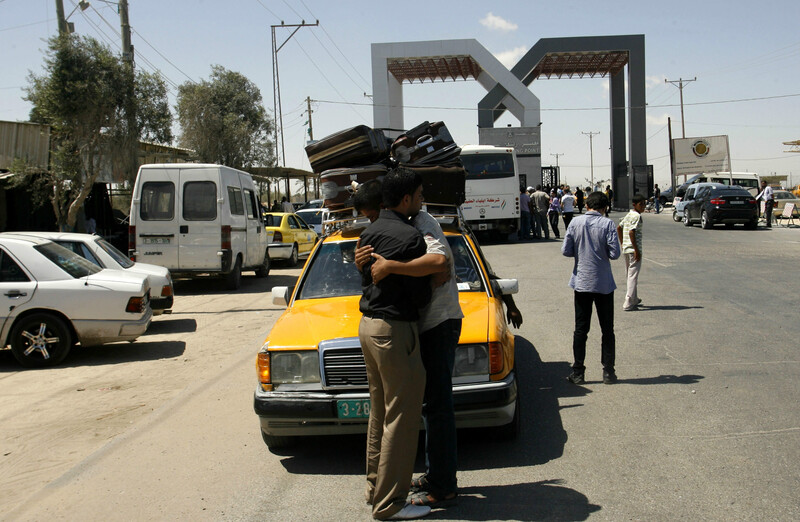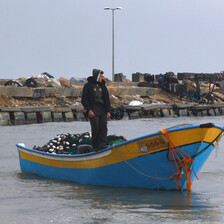The Electronic Intifada Rafah Crossing 4 September 2012

The Rafah crossing is the only entry and exit point for Palestinians in Gaza.
APA imagesRAFAH, Gaza (IPS) - “I waited from 10am till 5pm for my wife to cross from Egypt. She was among many hundreds who were coming into Gaza. Some waited since 6am, some since the day before.”
Jaber was relieved when, a few days before the Eid holiday began on 19 August, his wife was able to cross from Egypt into the Gaza Strip. During the three days of Eid, the Rafah border crossing was closed in both directions.
“Of course I was happy that my wife got through, but I was also disgusted at how Palestinians are forced to wait for, or are denied, the right to exit and enter our country,” he said.
On 25 August, the border opened anew, temporarily easing the worries of Palestinians in Gaza who feared the opposite outcome: indefinite closure.
Maher Abu Sabha, head of Gaza’s border crossings, explained the reason for such worries. “On 5 August, unidentified gunmen attacked an Egyptian military checkpoint near the Rafah crossing, killing 16 Egyptian soldiers. Immediately, many Israeli and Egyptian journalists wrote that Palestinians had committed the attack.”
Also immediately after the attacks — the perpetrators of which remain unknown — Egypt ordered the Rafah crossing closed.
“Just over a week later, near the end of Ramadan, the border reopened for three days for humanitarian cases needing to travel to or via Egypt, and for Palestinians needing to return to Gaza,” said Abu Sabha.
With no clear border procedure yet defined by Egyptian authorities, Palestinians in Gaza are wondering whether the easing of restrictions on border crossings introduced following Mohammad Morsi’s election as Egypt’s president will continue or whether the situation will revert back to the days of Hosni Mubarak’s dictatorship, when the crossing was often closed.
Waiting on Egypt
Abu Sabha said nothing is yet clear. “We’re still waiting for confirmation from the Egyptian authorities on what exactly the procedure will be at the Rafah crossing.” Yet, he said that relations between the internal administration in Gaza and the Morsi government are very good.
“Prime Minister Haniyeh [Ismail Haniyeh from the Hamas party in Gaza] has visited with Mr. Morsi. They have good relations and there is talk of positive developments for the border and of President Morsi’s promise that Rafah crossing will be open 12 hours every day,” said Abu Sabha.
After Hamas was democratically elected in 2006, and in tandem with implementation of the Israeli-led total siege of Gaza, the Rafah crossing border procedures became as trying as when Israel physically and militarily occupied the Gaza Strip.
The Israeli human rights group Gisha has reported that from June 2007 to March 2009, the Rafah crossing was closed permanently “except for random and limited openings by Egypt, which meet only 3 percent of the needs of the residents of the Gaza Strip to enter and leave.”
“During the hardest years of the ongoing siege of Gaza, Rafah was closed indefinitely. When it did sporadically open, only at most 400 could leave,” said Abu Sabha. “Mubarak was one of the key reasons for Gaza’s closure by the Egyptian side. Since he has been replaced, more people have been able to cross in and out of Gaza via Rafah.
A crossing “like no other”
“The Rafah crossing is like no other,” said Abu Sabha. “Other borders around the world, and even other Egyptian borders, are open 24 hours a day, seven days a week, no holidays. But Rafah closes Fridays and holidays and is only open from 10am to 6pm. It also differs from other borders because it is Palestinians’ only real door to the outside world.”
In 2000, Israel closed Gaza’s sole airport; Israeli bombings in 2001 destroyed it. Under international law, Palestinians, like any people, have the right to leave and enter their country, “a basic right, which the parties who exert control over Rafah crossing are obligated to respect and safeguard,” Gisha has noted.
Mazen Aiysh, 35, en route to Jordan to visit family, reiterated Abu Sabha’s words. “Our situation is different from anyone else’s, that’s obvious. Any other nationality can come and go as they like, but we can’t. It’s my right to leave my country to see my family, to travel, to go other places.”
Also exiting, Iman Salim, 58, said her return home to Jordan was delayed. “I was supposed to leave before today but wasn’t able to because the border closed. The attack that happened in Egypt has nothing to do with us, but we were punished nonetheless.”
Still waiting for the final word from Egypt, Abu Sabha is optimistic. “I hope that the Rafah crossing is opened for 24 hours a day, like borders anywhere else in the world, and that goods which are banned under the Israeli siege may be permitted to enter and exit through Rafah.”
Although happy to be reunited with his wife, Jaber does not share the optimism. “All of this control and these political games are to make our lives difficult and to destroy our will to live. No one actually wants to solve our problem.”
All rights reserved, IPS - Inter Press Service (2012). Total or partial publication, retransmission or sale forbidden.




